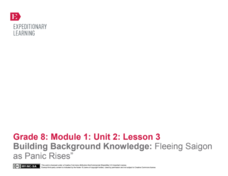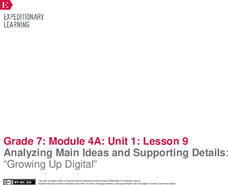EngageNY
Grade 10 ELA Module 4: Unit 3, Lesson 1
Is it better to be loved or feared? Using the resource, scholars explore Machiavelli's nonfiction text, The Prince, and examine the author's ideas about the role of leadership. Pupils also complete a Quick Write to analyze a central idea...
EngageNY
Building Background Knowledge: "Fleeing Saigon as Panic Rises”
How can scholars better understand the refugee experience? Pupils read Fox Butterfield's article "Panic Rises in Saigon, but the Exits are Few" and connect it to the novel Inside Out & Back Again. They annotate the text, looking for...
EngageNY
Building Background Knowledge, Predicting, and Focusing on Key Vocabulary: “Refugees: Who, Where, Why”
Using the fourth of 20 lessons from the Grade 8 ELA Module 1, Unit 2 series, scholars discuss refugees' challenges when finding a place to call home. They also read and answer text-based questions about the informational passage...
EngageNY
Analyzing the Content of a Model Essay: “How Ha’s Mother Is Turned ‘Inside Out’”
What are the psychological and emotional effects associated with being a refugee? Scholars consider the question by reading and analyzing an essay, "How Ha's Mother is Turned 'Inside Out.'" Once finished, they engage in a whole-class...
EngageNY
Analyzing the Significance of the Novel’s Title: Connecting the Universal Refugee Experience to Inside Out and Back Again, Part 2
How does poetry help people better understand societal issues? Pupils participate in a jigsaw activity to analyze poems from the novel Inside Out & Back Again. Next, they connect the poems to real-life refugee experiences from the...
EngageNY
Launching Researching: Reading for Gist and Gathering Evidence Using the Research Guide
Let's get to the gist! Pupils work in research teams to gather information about specific refugee experiences from Bosnia, Afghanistan, and Kurdistan. Scholars then try to find the gist of informational texts about their topics,...
EngageNY
Launching the Novel: Character Analysis of Ha
Scholars receive numbers as they work in groups to read Inside Out & Back Again. The instructor calls out specific numbers for readers to share the group's thoughts. Then, they use a model passage to demonstrate the effective actions...
EngageNY
End of Unit Assessment: How Word Choice Contributes to Tone and Meaning
It's finally time for pupils to show what they know! Scholars finalize the unit with an end-of-unit assessment. They use the book Inside Out & Back Again and the "Forgotten Ship" transcript to examine word choice, tone, and...
EngageNY
World Cafe: Analyzing Sojourner Truth’s “Ain’t I a Woman?”
May I take your order? Scholars read "Ain't I a Woman" and participate in a World Cafe. They work in small groups to discuss text-related questions and then complete a Note-Catcher sheet to organize their thoughts. For homework, learners...
EngageNY
Finishing Who? Where? and Why? Research
Who? Where? Why? Scholars answer these questions to help identify the gist of Inside Out & Back Again. First, they add text evidence to their research folders. They then begin looking at a performance task in which they write their...
EngageNY
Jigsaw to Analyze Mood and Tone in To Kill a Mockingbird (Chapter 8)
We have an appointment! Scholars meet with another discussion appointment to discuss the text structure of the poem "Incident" by Countee Cullen. They use a Note Catcher to guide their thinking and compare the structure to chapter 8 of...
EngageNY
Analyzing the Central Claim and Supporting Claims: “The Shakespeare Shakedown”
Scholars continue to analyze Simon Schama's article "The Shakespeare Shakedown." They participate in a jigsaw discussion to identify the author's argument and supporting claims. Pupils also write objective summaries of the text.
EngageNY
Researching Miné Okubo: Gathering Textual Evidence
Scholars read two texts about Miné Okubo’s life. In Riverside’s Miné Okubo and Miné Okubo, readers gather information to write narrative essays describing how Okubo became visible again. The essay serves as part of a performance task.
National Woman's History Museum
Defying British Rule: Women's Contributions to The American Revolution
Primary and secondary sources are the focus of a lesson that showcases the important role women played during the American Revolution. Pairs review sources and discuss their findings. A close-reading of an informational text leads the...
EngageNY
Close Reading: Excerpt 5 of “The Digital Revolution and the Adolescent Brain Evolution”
Class members consider how technology affects social interactions as they continue reading an article about the digital revolution and adolescent brain development. Then, working in pairs, scholars answer text-dependent questions and...
EngageNY
Analyzing Main Ideas and Supporting Details: “Growing Up Digital”
Young scholars continue their exploration of adolescent brain development by reading an informational text, "Growing Up Digital," by Matt Richtel. Then, with partners, they complete note-catcher worksheets to capture the article's main...
Teaching Tolerance
Media Consumers and Creators, What Are Your Rights and Responsibilities?
Teach the class to separate fact from fiction. Scholars explore the topic of fake news as they read PEN America's News Consumers' Bill of Rights and discuss the rights and responsibilities outlined in the bill. Next, they read an article...
Teaching Tolerance
You Are the Product
What does it mean for a product or service to go viral? Scholars explore the topic by reading an article about the economics of social media. After reading, they complete a 3-2-1 data chart with information they learned from the text and...
EngageNY
Evaluating an Argument: “Is Google Making Us Stupid?”
Does the Internet negatively affect peoples' brains? Scholars complete a Tracing an Argument note catcher to evaluate the question as they read the text "Is Google Making Us Stupid?" Exploring both sides of the issue, they add their...
Teaching Tolerance
News Consumers' Bill of Rights and Responsibilities
Believe it or not, people have rights as new consumers. Scholars read PEN America's News Consumers' Bill of Rights and Responsibilities and work in small groups to paraphrase chosen sections of the text. Next, they create and present...
EngageNY
Using Effective Search Terms: Researching Screen Time
The proof is in the reading. Scholars read an article, "Attached to Technology and Paying the Price," and answer text-dependent questions. Next, they complete a Venn diagram to contrast two authors' use of evidence on the topic of screen...
EngageNY
Analyzing Interaction: Categories of Water Management in The Big Thirst
It's puzzle time! Pupils participate in a jigsaw activity to discuss the various uses of water, including personal, agricultural, and industrial uses. They also conduct a close reading of The Big Thirst by Charles Fishman and answer...
EngageNY
Finding Relevant Information and Asking Research Questions: The Big Thirst
Let's get to the gist. As scholars continue their study of Charles Fishman's The Big Thirst, they practice writing the gist of the text. Additionally, pupils add notes about the industrial uses of water to their researcher's notebooks.
EngageNY
Using Effective Search Terms: Researching Water Management
Discover how to use search terms effectively! Scholars continue their exploration of Charles Fishman's The Big Thirst, engaging in a read aloud and then answering text-based questions. Next, pupils learn about using search terms and...
Other popular searches
- Nonfiction Text
- Nonfiction Text Features
- Informational Texts
- Comparing Texts
- Reading Informational Texts
- Informative Text
- Expository Texts
- Choral Speaking Texts
- Expository Texts Examples
- Summarizing Nonfiction Text
- Nonfiction Text Structures
- Persuasive Texts

























